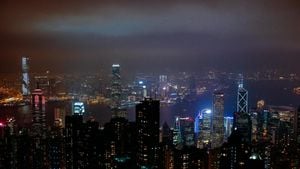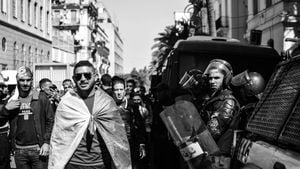Canadian Prime Minister Justin Trudeau has recently taken a firm stance against allegations linking Indian officials, including Prime Minister Narendra Modi and External Affairs Minister S. Jaishankar, to the assassination of Hardeep Singh Nijjar, a prominent Khalistani separatist leader. At a media event in Brampton, Ontario, Trudeau labeled claims made by one of his officials as "criminal." This dramatic response arose after reports emerged from The Globe and Mail, indicating Canadian security agencies believed Modi was aware of violent plots purportedly orchestrated against Nijjar.
Trudeau expressed his dissatisfaction during the press conference, emphasizing, "We have seen, unfortunately, those leaking top-secret information to the media have consistently gotten those stories wrong. That is why we conducted a national inquiry. These leaks are unreliable and are criminal on their face." The Prime Minister’s advisor quickly dismissed the accusations as speculative, aiming to quell the growing tensions.
Nathalie Drouin, Trudeau's intelligence adviser, added to the chorus of denial, stating, "The Government of Canada has not stated, nor is it aware of evidence linking Prime Minister Modi, Minister Jaishankar, or NSA Doval to serious criminal activity within Canada. Any suggestion to the contrary is both speculative and inaccurate." This clarifies Canada’s official position and seeks to distance itself from broader accusations against Indian leadership.
The situation escalated tensions between India and Canada, two nations already grappling with strained diplomatic relations. Canada has accused India of being indirectly involved in Nijjar's murder—claims strongly rebutted by New Delhi, which termed the allegations as "absurd" and motivated by the internal politics surrounding Canadian elections.
India has accused Canada of providing refuge to terrorists and criminals who pose threats to its national security. Following the allegations, India recalled its diplomats from Ottawa, adding fuel to the already fierce diplomatic row.
On June 18, 2022, Hardeep Singh Nijjar was shot and killed outside a Gurdwara in Surrey, British Columbia. Following his assassination, Trudeau claimed to have received credible evidence pointing toward Indian involvement, igniting controversy and reaction from Indian authorities, who demanded action against the anti-India sentiments flourishing on Canadian soil.
Recent developments indicate the Canadian police apprehended Arshdeep Singh, also known as Arsh Dalla, seen as Nijjar's close associate and acting chief of the Khalistani Tiger Force, designated as a terrorist organization by India. Singh's arrest during efforts to curb gang violence adds layers to the narrative around extremists operating within Canadian borders, providing some basis for India's concerns.
Trudeau’s insistence on addressing the leaks and the lack of evidence for the allegations seem strategically aimed at preserving diplomatic channels with India. He reiterated his administration's commitment to investigate any foreign interference and protect Canadian sovereignty, signaling the potential for reconciliatory efforts after the dust settles.
Given the complex nature of international relations and the sensitive issue around alleged foreign interference, the diplomatic tussle is likely to evolve. How Canada, India, and their leaders navigate this politically charged environment remains to be seen. Will both nations prioritize dialogue to untangle this web of allegations, or will tensions escalate with lasting repercussions?



